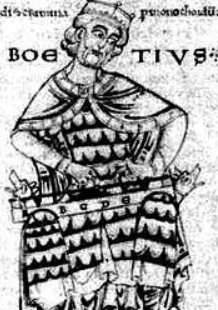
Boethius
Boethius Anicio Manlio Torquato Severino (Anicius Manlius Torquatus Severinus Boëthius). - He was born in Rome, perhaps in 480 AD. C. or a little later. He belonged to the Boëthii branch of the illustrious Anicii family. His father died, perhaps he was welcomed into the house by his friend Quinto Aurelio Simmaco and educated there. He later married Symmachus's daughter, Rusticana. He soon took up studies, so much so that in 505 Cassiodorus could praise the services long ago rendered by Boethius to Roman culture with his translations from Greek. Very young he was commissioner and patrician. In 505 he was commissioned by King Theodoric to find good citrate for Clovis, king of the Franks, and to procure a water and sun clock for Gundobaldo, king of the Burgundians, choosing the right people to build it. In 510 B. was elected consul; in 522 his two sons, still children, were raised to this dignity: for which honor he thanked the king by sending him a eulogy in the senate. In September of the same year 522, he became Magister officiorum. In his offices, he could later boast of having sometimes freed individuals and provinces from unjust oppression. However, despite such sovereign favor, he was, like many of his ranks, a secret enemy of the Ostrogothic regime. When the referendum Cyprian accused Albino of understanding with Byzantium, B. defended him, and in Verona, in his speech before Theodoric, he declared that he himself and the entire senate would have to accuse themselves if Albino was to blame. Thus he was himself blamed for having worked for the Libertas Romana; and he was then also accused of sacrilegium. Locked, it seems, in the tower of the Pavia baptistery, he composed his most famous writing in that prison, De consolatione Philosophiae, one of the most read, most translated, most imitated books in the literature of all time. Finally, he was without being listened to, sentenced to death, and, according to a tradition, tortured and executed (524 or 525) in the Ager Calventianus near Milan, according to another beheaded in the same prison as him.
